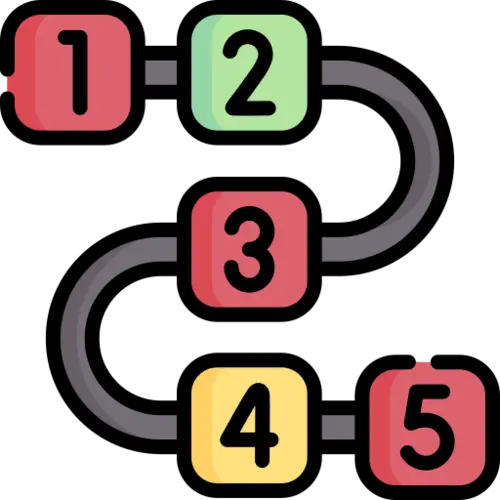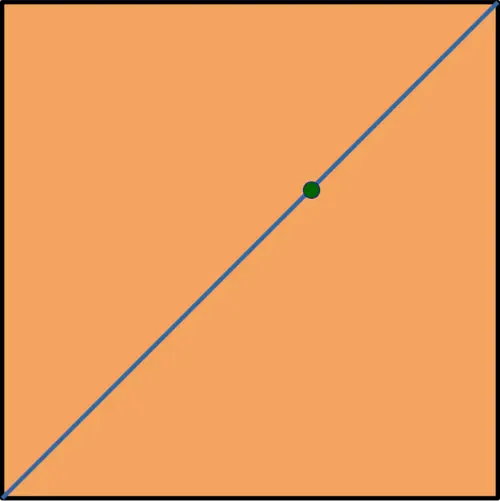Binomial Theorem
Binomial expansion and coefficients
\[ (x+a)^n = \binom{n}{0}x^n + \binom{n}{1}x^{n-1}a + \binom{n}{2}x^{n-2}a^2 + \dots + \binom{n}{r}x^{n-r}a^r + \dots + \binom{n}{n}a^n \]
\[ \binom{n}{r} = \frac{n!}{(n-r)! \, r!} = \binom{n}{n-r} \] \[ = \frac{n (n-1) (n-2) \dots (n-r+1)}{r!} \]
If \(\binom{n}{r_1} = \binom{n}{r_2}\), then either \(r_1 = r_2\) or \(r_1 = n-r_2\).
The \(n^{th}\) term in the binomial expansion is \[ T_{r+1} = \binom{n}{r} x^{n-r} a^r \] The \(x\)-th term from last is \(T_{(n-x)+2}\).
Middle term in binomial expansion
- If \(n\) is even, middle term = \(T_{\frac{n}{2}+1}\)
- If \(n\) is odd, middle terms = \(T_{\frac{n+1}{2}}\) and \(T_{\frac{n+3}{2}}\)
Binomial coefficient is maximum for middle term(s)
Find \(7^{th}\) term in the binomial expansion of \((3+x)^9\).
\[ T_7 = T_{6+1} = \binom{9}{6} \cdot 3^{9-6} \cdot x^6 = \binom{9}{6} \cdot 3^3 \cdot x^6 \]
Find coeff. of \(x^2\) in \((x-2)^2 (x+7)^{13}\).
Expand the first bracket \[ (x^2 - 4x + 4)(x+7)^{13} \] Coefficient of \(x^2\) is \[ 7^{13} - 4 \binom{13}{1} 7^{12} + 4 \binom{13}{2} 7^{11} \]
Find coeff. of \(x^2\) in \((x-2)^2 (x-7)^{13}\).
\[ \text{Coeff of } x^2 = (-7)^{13} - 4 \binom{13}{1} 7^{12} + 4 \binom{13}{2} 7^{11} \] \[ = -7^{13} + 4 \binom{13}{1} 7^{12} + 4 \binom{13}{2} 7^{11} \]
Find coeff. of \(x^{15}\) in \((x^2 - \tfrac{1}{x})^{51}\).
General term in the binomial expansion is given by \[ T_{r+1} = \binom{51}{r} (x^2)^{51-r} \left(-\frac{1}{x}\right)^r \] \[ = \binom{51}{r} (-1)^r x^{2(51-r)} \cdot x^{-r} \] \[ = \binom{51}{r} (-1)^r x^{102 - 3r} \] We need \(102 - 3r = 15 \implies r = 29\). \[ T_{30} = \binom{51}{29} (-1)^{29} x^{15} \] Therefore, coefficient of \(x^{15}\) is \( -\binom{51}{29} \)
Find coeff. of \(x^{11}\) in \((x^2 + 3x + 2)^6\).
\[ (x+2)^6 (x+1)^6 \] Coefficient of \(x^{11}\) is \[ \binom{6}{0} \cdot x^6 \cdot \binom{6}{5} x^5 + \binom{6}{1} x^5 \cdot \binom{6}{6} x^6 \] \[ = 6x^{11} + 12x^{11} = 18x^{11} \]
Find coeff. of \(x^r\) where \(r \in [0,n]\) in \((1+x) + (1+x)^2 + (1+x)^3 + \dots + (1+x)^n\).
\[ S = (1+x) + (1+x)^2 + \dots + (1+x)^n \] This is a GP: \[ S = \frac{(1+x)((1+x)^n - 1)}{(1+x) - 1} \] \[ = \frac{(1+x)((1+x)^n - 1)}{x} = \frac{(1+x)^{n+1} - (1+x)}{x} \] Coefficient of \(x^r\) in \(S\) comes from coeff. of \(x^{r+1}\) in numerator. \[ \Rightarrow \binom{n+1}{r+1} x^r \]
Numerically greatest term (maximum modulus term) in binomial expansion
Let greatest term be \(T_{r+1}\), such that \[ |T_{r+1}| \geq |T_r| \] \[ \left|\binom{n}{r} x^{n-r} a^r\right| \geq \left|\binom{n}{r-1} x^{n-r+1} a^{r-1}\right| \] \[ \Rightarrow \frac{\binom{n}{r}}{\binom{n}{r-1}} |a| \geq |x| \] \[ \Rightarrow \frac{n-r+1}{r} |a| \geq |x| \] \[ \frac{|a|}{r} \geq \frac{|x|}{n-r+1} \] \[ \Rightarrow \frac{(n+1)|a|}{|x|+|a|} > r \] Hence, till the time this inequality is satisfied, value of \(r\) can be found for the greatest numerical term.
Case I: If inequality does not hold in integer, then \[ r = \lfloor \text{LHS} \rfloor + 1 \] Example: For 4.53, answer = 5.
Case II: If inequality holds in integer, then \[ r = \text{LHS}, \quad r = \text{LHS} + 1 \] Example: For 4, answers are 4 and 5. Thus, both \(T_5\) and \(T_4\) are numerically greatest.
Properties of binomial coefficients
Put \(x=1\) in the binomial expansion of \((1+x)^n\) \[ \binom{n}{0} + \binom{n}{1} + \binom{n}{2} + \dots + \binom{n}{n}=2^n \] Put \(x=-1\) in the binomial expansion of \((1+x)^n\) \[ \binom{n}{0} - \binom{n}{1} + \binom{n}{2} - \binom{n}{3} + \dots=0 \] Together they imply \[\binom{n}{0} + \binom{n}{2} + \binom{n}{4} + \dots \dots = 2^{n-1} =\binom{n}{1} + \binom{n}{3} + \binom{n}{5}+ \dots + \dots \]
\[\binom{n}{r} = \frac{n}{r} \binom{n-1}{r-1}\] \[\binom{n}{r} + \binom{n}{r+1} = \binom{n+1}{r+1}\]
Series containing binomial coefficients
Calculate the sum of the series\[\binom{n}{1} + 2\binom{n}{2} + 3\binom{n}{3} + \dots + n\binom{n}{n}\]
We know \[ (1+x)^n = \binom{n}{0} + \binom{n}{1}x + \binom{n}{2}x^2 + \dots + \binom{n}{n}x^n \] Differentiate both sides \[ n(1+x)^{n-1} = \binom{n}{1} + 2\binom{n}{2}x + 3\binom{n}{3}x^2 + \dots + n\binom{n}{n}x^{n-1} \] Putting \(x=1\) \[ n \cdot 2^{n-1} = \binom{n}{1} + 2\binom{n}{2} + 3\binom{n}{3} + \dots + n\binom{n}{n} \]
Calculate the sum of the series\[\binom{n}{1} - 2\binom{n}{2}2 + 3\binom{n}{3}2^2 - \dots + n\binom{n}{n}2^n\]
We know \[ (1+x)^n = \binom{n}{0} + \binom{n}{1}x + \binom{n}{2}x^2 + \dots + \binom{n}{n}x^n \] Differentiate both sides \[ n(1+x)^{n-1} = \binom{n}{1} + 2\binom{n}{2}x + 3\binom{n}{3}x^2 + \dots + n\binom{n}{n}x^{n-1} \] Putting \(x=2\) in \[ n \cdot 2^{n-1} = \binom{n}{1} + 2\binom{n}{2} + 3\binom{n}{3} + \dots + n\binom{n}{n} \]
Calculate the sum of the series\[\binom{n}{1} - 2\binom{n}{2} + 3\binom{n}{3} - \dots \]
We know \[ (1+x)^n = \binom{n}{0} + \binom{n}{1}x + \binom{n}{2}x^2 + \dots + \binom{n}{n}x^n \] Differentiate both sides \[ n(1+x)^{n-1} = \binom{n}{1} + 2\binom{n}{2}x + 3\binom{n}{3}x^2 + \dots + n\binom{n}{n}x^{n-1} \] Putting \(x=-1\) in \[ n \cdot 2^{n-1} = \binom{n}{1} + 2\binom{n}{2} + 3\binom{n}{3} + \dots + n\binom{n}{n} \]
Calculate the sum of the series\[3\binom{n}{0} + 4\binom{n}{1} + 5\binom{n}{2} + 6\binom{n}{3} + \dots + (n+3)\binom{n}{n}\]
We know \[ (1+x)^n = \binom{n}{0} + \binom{n}{1}x + \binom{n}{2}x^2 + \dots + \binom{n}{n}x^n \] Multiply with \(x^3\) and differentiate w.r.t. \(x\): \[ x^3(1+x)^n = \binom{n}{0}x^3 + \binom{n}{1}x^4 + \binom{n}{2}x^5 + \dots \] Differentiate \[ 3x^2(1+x)^n + nx^3(1+x)^{n-1}= 3\binom{n}{0}x^2 + 4\binom{n}{1}x^3 + 5\binom{n}{2}x^4 + \dots \] Now put \(x=1\) \[ 3 \cdot 2^n + n \cdot 2^{n-1} = 3\binom{n}{0} + 4\binom{n}{1} + 5\binom{n}{2} + \dots + (n+3)\binom{n}{n} \]
Calculate the sum of the series\[ 1 \cdot 2 \binom{n}{1} + 2 \cdot 3 \binom{n}{2} + \dots \]
\[ (1+x)^n = \binom{n}{0} + \binom{n}{1}x + \binom{n}{2}x^2 + \dots \]
Multiply by \(x\): \[ x(1+x)^n = \binom{n}{0}x + \binom{n}{1}x^2 + \binom{n}{2}x^3 + \dots \]
Differentiate w.r.t \(x\): \[ (1+x)^n + nx(1+x)^{n-1} = \binom{n}{0} + 2\binom{n}{1}x + 3\binom{n}{2}x^2 + \dots \]
Differentiate again w.r.t \(x\): \[ n(1+x)^{n-1} + n(1+x)^{n-1} + n(n-1)x(1+x)^{n-2} = 1 \cdot 2 \binom{n}{1} + 2 \cdot 3 \binom{n}{2}x + 3 \cdot 4 \binom{n}{3}x^2 + \dots \]
Put \(x=1\): \[ 2n \cdot 2^{n-1} + n(n-1)2^{n-2} = 1 \cdot 2 \binom{n}{1} + 2 \cdot 3 \binom{n}{2} + 3 \cdot 4 \binom{n}{3} + \dots \]
Calculate the sum of the series\[1^2 \cdot 2^2 \binom{n}{1} + 2^2 \cdot 3^2 \binom{n}{2} + \dots \]
Hint: Multiply with \(x\) and differentiate. Do this twice.
Calculate the sum of the series\[1 \cdot 2 \binom{n}{1} + 3 \cdot 4 \binom{n}{3} + 5 \cdot 6 \binom{n}{5} + \dots \]
\[ n(1+x)^{n-1} + n(1+x)^{n-1} + n(n-1)x(1+x)^{n-2} = 1 \cdot 2 \binom{n}{1} + 3 \cdot 4 \binom{n}{3}x^2 + 5 \cdot 6 \binom{n}{5}x^4 + \dots \]
Put \(x=1\) \[ 1 \cdot 2 \binom{n}{1} + 2 \cdot 3 \binom{n}{2} + 3 \cdot 4 \binom{n}{3} + \dots = 2n2^{n-1} + n(n-1)2^{n-2} \]
Put \(x=-1\) \[ 1 \cdot 2 \binom{n}{1} - 2 \cdot 3 \binom{n}{2} + 3 \cdot 4 \binom{n}{3} - \dots = 0 \]
Sum the above two equations \[ 2(1 \cdot 2 \binom{n}{1} + 3 \cdot 4 \binom{n}{3} + \dots) = 2n2^{n-1} + n(n-1)2^{n-2} \]
\[ \Rightarrow 1 \cdot 2 \binom{n}{1} + 3 \cdot 4 \binom{n}{3} + \dots = n2^{n-1} + n(n-1)2^{n-2} \]
Calculate the sum of the series \[7 \binom{n}{0} + 10 \binom{n}{1} + 13 \binom{n}{2} + 16 \binom{n}{3} + \dots \]
\[ (1+x)^n = \binom{n}{0} + \binom{n}{1}x + \binom{n}{2}x^2 + \binom{n}{3}x^3 + \dots \]
As difference in successive coefficients is 3, \[ (1+x^3)^n = \binom{n}{0} + \binom{n}{1}x^3 + \binom{n}{2}x^6 + \binom{n}{3}x^9 + \dots \]
Multiply with \(x^7\) \[ x^7(1+x^3)^n = x^7 \binom{n}{0} + x^{10}\binom{n}{1} + \dots \]
Differentiate w.r.t \(x\) \[ 7x^6(1+x^3)^n + n(1+x^3)^{n-1} \cdot x^2 \cdot 7 = 7 \binom{n}{0}x^6 + \dots \]
Put \(x=1\) \[ 7 \cdot 2^n + n \cdot 2^{n-1} = 7\binom{n}{0} + 10\binom{n}{1} + 13\binom{n}{2} + \dots \]
Series with product of two binomial coefficients having constant upper suffix and constant sum of lower suffix
Calculate the sum of the series \[\binom{n}{0}\binom{n}{n} + \binom{n}{1}\binom{n}{n-1} + \binom{n}{2}\binom{n}{n-2} + \dots + \binom{n}{n}\binom{n}{0} \]
\[ (1+x)^n = \binom{n}{0} + \binom{n}{1}x + \binom{n}{2}x^2 + \dots \]
\[ (1+x)^n = \binom{n}{0} + \binom{n}{1}x + \binom{n}{2}x^2 + \dots \]
Multiply the two equations \[ (1+x)^{2n} = \left(\binom{n}{0} + \binom{n}{1}x + \binom{n}{2}x^2 + \dots\right) \cdot \left(\binom{n}{0} + \binom{n}{1}x + \binom{n}{2}x^2 + \dots\right) \]
\[ (1+x)^{2n} = x^n \left( \binom{n}{0}\binom{n}{n} + \binom{n}{1}\binom{n}{n-1} + \dots \right) + \text{something} \]
We require coefficient corresponding to \(x^n\) \[ \Rightarrow\binom{n}{0}\binom{n}{n} + \binom{n}{1}\binom{n}{n-1} + \binom{n}{2}\binom{n}{n-2} + \dots = \binom{2n}{n} \]
Calculate the sum of the series \[\binom{n}{0}\binom{n}{n-2} + \binom{n}{1}\binom{n}{n-3} + \binom{n}{2}\binom{n}{n-4} + \dots + \binom{n}{n-2}\binom{n}{0}\]
Using same method as last question \[ (1+x)^{2n} = x^n \left( \binom{n}{0}\binom{n}{n} + \binom{n}{1}\binom{n}{n-1} + \dots \right) + x^{n-2} \left( \binom{n}{0}\binom{n}{n-2} + \binom{n}{1}\binom{n}{n-3} + \binom{n}{2}\binom{n}{n-4} + \dots + \binom{n}{n-2}\binom{n}{0} \right)+ \text{something} \] We need coefficient of \(x^{n-2}\) \[ \Rightarrow \binom{n}{0}\binom{n}{n-2} + \binom{n}{1}\binom{n}{n-3} + \binom{n}{2}\binom{n}{n-4} + \dots = \binom{2n}{n-2} \]
Calculate the sum of the series \[ \binom{n}{0}\binom{n}{n-2} - \binom{n}{1}\binom{n}{n-3} + \binom{n}{2}\binom{n}{n-4} - \dots + (-1)^{n-2}\binom{n}{n-2}\binom{n}{0} \]
We start with binomial expansions: \[ (1-x)^n = \binom{n}{0} - \binom{n}{1}x + \binom{n}{2}x^2 - \binom{n}{3}x^3 + \cdots \] \[ (1+x)^n = \binom{n}{0} + \binom{n}{1}x + \binom{n}{2}x^2 + \binom{n}{3}x^3 + \cdots \]
Multiplying, \[ (1-x)^n(1+x)^n = (1-x^2)^n \] \[ = \Big(\binom{n}{0} - \binom{n}{1}x + \binom{n}{2}x^2 - \cdots\Big)\Big(\binom{n}{0} + \binom{n}{1}x + \binom{n}{2}x^2 + \cdots\Big) \]
We want the coefficient of \(x^{n-2}\). From the binomial theorem: \[ T_r = (-1)^r \binom{n}{r} (x^2)^r \]
Thus, \(x^{n-2}\) term appears when \[ 2r = n-2 \quad \Rightarrow \quad r = \frac{n-2}{2} \]
- If \(n\) is even: \(r\) is an integer, so the coefficient is \[ (-1)^{\tfrac{n-2}{2}} \binom{n}{\tfrac{n-2}{2}} \]
- If \(n\) is odd: \(\tfrac{n-2}{2}\) is not an integer, so no such term exists.
Calculate the sum of the series \[ \binom{n}{1}\binom{n}{n} + 2\binom{n}{2}\binom{n}{n-1} + 3\binom{n}{3}\binom{n}{n-2} + \cdots + n\binom{n}{n}\binom{n}{1} \]
Recall: \[ (1+x)^n = \binom{n}{0} + \binom{n}{1}x + \binom{n}{2}x^2 + \cdots \tag{1} \] Differentiate w.r.t \(x\): \[ n(1+x)^{n-1} = \binom{n}{1} + 2\binom{n}{2}x + 3\binom{n}{3}x^2 + \cdots \tag{2} \]
Multiplying (1) and (2), \[ n(1+x)^{2n-1} = (\binom{n}{0} + \binom{n}{1}x + \binom{n}{2}x^2 + \cdots)(\binom{n}{1} + 2\binom{n}{2}x + 3\binom{n}{3}x^2 + \cdots) \]
Thus the coefficient of \(x^n\) is: \[ \binom{n}{1}\binom{n}{n} + 2\binom{n}{2}\binom{n}{n-1} + 3\binom{n}{3}\binom{n}{n-2} + \cdots + n\binom{n}{n}\binom{n}{1} \]
But from binomial theorem: \[ \text{Coefficient of } x^n \text{ in } n(1+x)^{2n-1} = n \binom{2n-1}{n} \]
Hence, \[ \binom{n}{1}\binom{n}{n} + 2\binom{n}{2}\binom{n}{n-1} + \cdots + n\binom{n}{n}\binom{n}{1} = n \binom{2n-1}{n} \]
Calculate the sum of the series \[ 3\binom{n}{0}\binom{n}{n-1} + 4\binom{n}{1}\binom{n}{n-2} + \cdots \]
Start with \[ (1+x)^n = \binom{n}{0} + \binom{n}{1}x + \binom{n}{2}x^2 + \cdots \tag{i} \] Multiply by \(x^3\) and differentiate: \[ \frac{d}{dx}\big[x^3(1+x)^n\big] = 3x^2(1+x)^n + nx^3(1+x)^{n-1} \] \[ = 3\binom{n}{0}x^2 + 4\binom{n}{1}x^3 + \cdots \tag{ii} \]
Multiply \((i)\) and \((ii)\): \[ 3x^2(1+x)^{2n} + nx^3(1+x)^{2n-1}= (3\binom{n}{0}x^2 + 4\binom{n}{1}x^3 + \cdots)(\binom{n}{0} + \binom{n}{1}x + \binom{n}{2}x^2 + \cdots) \]
So, we need the coefficient of \(x^{n+1}\): \[ 3\binom{2n}{n-1} + n\binom{2n-1}{n-2} \]
Find the sum of \[ \binom{n}{0}\binom{n}{n} - \binom{n}{1}\binom{n+1}{n} + \binom{n}{2}\binom{n+2}{n} - \cdots \text{ up to $n$ terms} \]
Let \[ S = \binom{n}{0}\binom{n}{n} - \binom{n}{1}\binom{n+1}{n} + \binom{n}{2}\binom{n+2}{n} - \cdots \]
We note that \[ \binom{n}{r}\binom{n+r}{n} = \text{coefficient of } x^n \text{ in } \binom{n}{r}(1+x)^{n+r} \]
Hence \[ S = \text{coefficient of } x^n \text{ in } \bigg[ \binom{n}{0}(1+x)^n - \binom{n}{1}(1+x)^{n+1} + \binom{n}{2}(1+x)^{n+2} - \cdots \bigg] \]
Factorizing: \[ S = \text{coefficient of } x^n \text{ in } (1+x)^n \bigg[\binom{n}{0} - \binom{n}{1}(1+x) + \binom{n}{2}(1+x)^2 - \cdots\bigg] \]
The expression inside brackets is: \[ (1 - (1+x))^n = (-x)^n \]
\[ \therefore S = \text{coefficient of } x^n \text{ in } (1+x)^n \cdot (-x)^n \]
Simplify: \[ (1+x)^n \cdot (-x)^n = (-1)^n x^n (1+x)^n \]
The coefficient of \(x^n\) is: \[ (-1)^n \binom{n}{n} = (-1)^n. \] \[ \Rightarrow S = (-1)^n \]
Evaluate \[ \sum_{r=0}^n (2r+1)\binom{2n}{r} \]
Method 1:
Start with: \[ (1+x^2)^{2n} = \binom{2n}{0} + \binom{2n}{1}x^2 + \binom{2n}{2}x^4 + \cdots + \binom{2n}{2n}x^{4n} \]
Multiply by \(x\): \[ x(1+x)^{2n} = \binom{2n}{0}x + \binom{2n}{1}x^3 + \binom{2n}{2}x^5 + \cdots + \binom{2n}{2n}x^{4n+1} \]
Differentiate w.r.t \(x\): \[ \frac{d}{dx}\Big[x(1+x^2)^{2n}\Big] = (1+x^2)^{2n} + 2n x (1+x^2)^{2n-1}=\binom{2n}{0} + 3\binom{2n}{1}x^2 + \cdots \]
Putting \(x=1\): \[ 2^{2n} + n \cdot 2^{2n-1} = \binom{2n}{0} + 3\binom{2n}{1} + \cdots + (2n+1) \text{ terms} \]
Method 2:
Consider the general term: \[ T_r = (2r+1)^2\binom{2n}{r}=4r^2\binom{2n}{r}+\binom{2n}{r}+4r\binom{2n}{r} \] Now calculate the sum of each term individually.
Calculate \[ \binom{n}{n} + \binom{n+1}{n} + \cdots + \binom{2n}{n} \]
coeff of \(x^n\) in \[ \big[(1+x)^n + (1+x)^{n+1} + \cdots + (1+x)^{2n}\big] \]
\[= (1+x)^n \Big[1 + (1+x) + \cdots + (1+x)^n\Big]\] Solve the term inside bracket using sum of geometric series. Then, identify the coefficient of \(x^n\).
\(f(n) = \sum_{r=1}^n \left[ (r)^2 \left(\binom{n}{r}-\binom{n}{r-1}\right) + (2r+1)\binom{n}{r}\right]\). Find \(\frac{f(30)}{120}\)
\[f(n)= \sum \Big((r+1)^2 \binom{n}{r} - (r)^2 \binom{n}{r-1}\Big)\]
Use \(V_n\) method from sequence and series to solve this.
Multinomial theorem
Coefficient of \(x^\alpha y^\beta z^\gamma\) in \((x+y+z)^n\), where \(\alpha + \beta + \gamma = n\), is \[ \frac{n!}{\alpha! \, \beta! \, \gamma!} \]
\[(x+y+z)(x+y+z)\cdots(x+y+z)\quad n \text{ times}\]
\(\alpha\)–\(x\) has to be taken out of \(n\) brackets \(\Rightarrow \binom{n}{\alpha}\)
\(\beta\)–\(y\) has to be taken out of remaining brackets \(= \binom{n-\alpha}{\beta}\)
\(\gamma\)–\(z\) has to be taken out of remanining brackets \(= \binom{n-\alpha-\beta}{\gamma}\)
Therefore, the coefficient is \[\binom{n}{\alpha} \binom{n-\alpha}{\beta} \binom{n-\alpha-\beta}{\gamma}\]
\[=\dfrac{n!}{\alpha! (n-\alpha)!} \cdot \dfrac{(n-\alpha)!}{\beta! (n-\alpha-\beta)!} \cdot \dfrac{(n-\alpha-\beta)!}{\gamma!}\]
\[=\dfrac{n!}{\alpha! \, \beta! \, \gamma!}\]
Author
Anurag Gupta is an M.S. graduate in Electrical and Computer Engineering from Cornell University. He also holds an M.Tech degree in Systems and Control Engineering and a B.Tech degree in Electrical Engineering from the Indian Institute of Technology, Bombay.
Comment
This policy contains information about your privacy. By posting, you are declaring that you understand this policy:
- Your name, rating, website address, town, country, state and comment will be publicly displayed if entered.
- Aside from the data entered into these form fields, other stored data about your comment will include:
- Your IP address (not displayed)
- The time/date of your submission (displayed)
- Your email address will not be shared. It is collected for only two reasons:
- Administrative purposes, should a need to contact you arise.
- To inform you of new comments, should you subscribe to receive notifications.
- A cookie may be set on your computer. This is used to remember your inputs. It will expire by itself.
This policy is subject to change at any time and without notice.
These terms and conditions contain rules about posting comments. By submitting a comment, you are declaring that you agree with these rules:
- Although the administrator will attempt to moderate comments, it is impossible for every comment to have been moderated at any given time.
- You acknowledge that all comments express the views and opinions of the original author and not those of the administrator.
- You agree not to post any material which is knowingly false, obscene, hateful, threatening, harassing or invasive of a person's privacy.
- The administrator has the right to edit, move or remove any comment for any reason and without notice.
Failure to comply with these rules may result in being banned from submitting further comments.
These terms and conditions are subject to change at any time and without notice.
Similar content






Past Comments